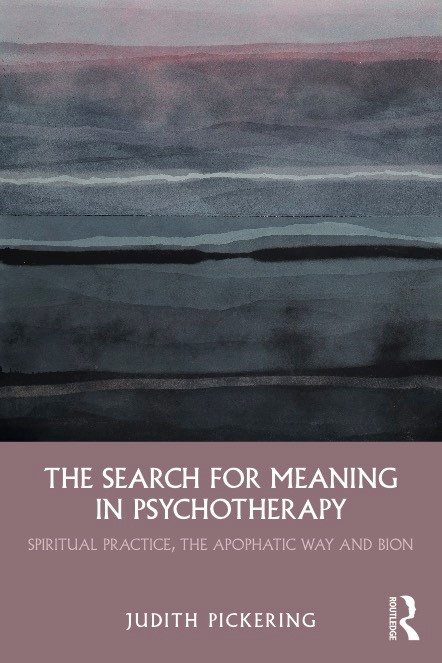Judith Pickering, Routledge, 2019

The Search for Meaning in Psychotherapy: Spiritual Practice, the Apophatic Way and Bion – Judith Pickering, Routledge, 2019
2020 American Board & Academy of Psychoanalysis (ABAPsa) book award winner
Available for purchase via Routledge
If, when a patient enters therapy, there is an underlying yearning to discover a deeper sense of meaning or purpose, how might the therapist rise to such a challenge? As both Carl Jung and Wilfred Bion observed, the patient may be asking something of the therapist that is intrinsically spiritual as well as psychotherapeutic. Presented in two parts, The Search for Meaning in Psychotherapy is a profound inquiry into the contemplative, mystical and apophatic dimensions of psychoanalysis.
What transformative qualities might a therapist emanate which may inspire processes of healing, growth and realisation in a patient? Part One, The Listening Cure: Psychotherapy as Spiritual Practice, considers the confluence between psychotherapy, spirituality, mysticism, meditation and contemplation. The book explores qualities such as presence, awareness, attention, mindfulness, calm abiding, reverie, patience, compassion, insight and wisdom, as well as showing how they may be enhanced by meditative and spiritual practice.
Part Two, A Ray of Divine Darkness: Psychotherapy and the Apophatic Way, explores the relevance of apophatic mysticism to psychoanalysis, particularly showing its inspiration through the work of Wilfred Bion. Paradoxically using language to unsay itself, the apophatic points towards absolute reality as ineffable and unnameable. So too, Bion observed, psychoanalysis requires the ability to dwell in mystery awaiting intimations of ultimate truth, O, which cannot be known, only realised. Pickering reflects on the works of key Christian mystics including Dionysius, Meister Eckhart and St John of the Cross, Buddhist teachings on meditation, Śūnyatā and Dzogchen, and Levinas’ ethics of alterity.
The Search for Meaning in Psychotherapy will be of great interest to both trainees and accomplished practitioners in psychoanalysis, analytical psychology, psychotherapy and counselling, as well as scholars of religious studies, those in religious orders, spiritual directors, priests and meditation teachers.
